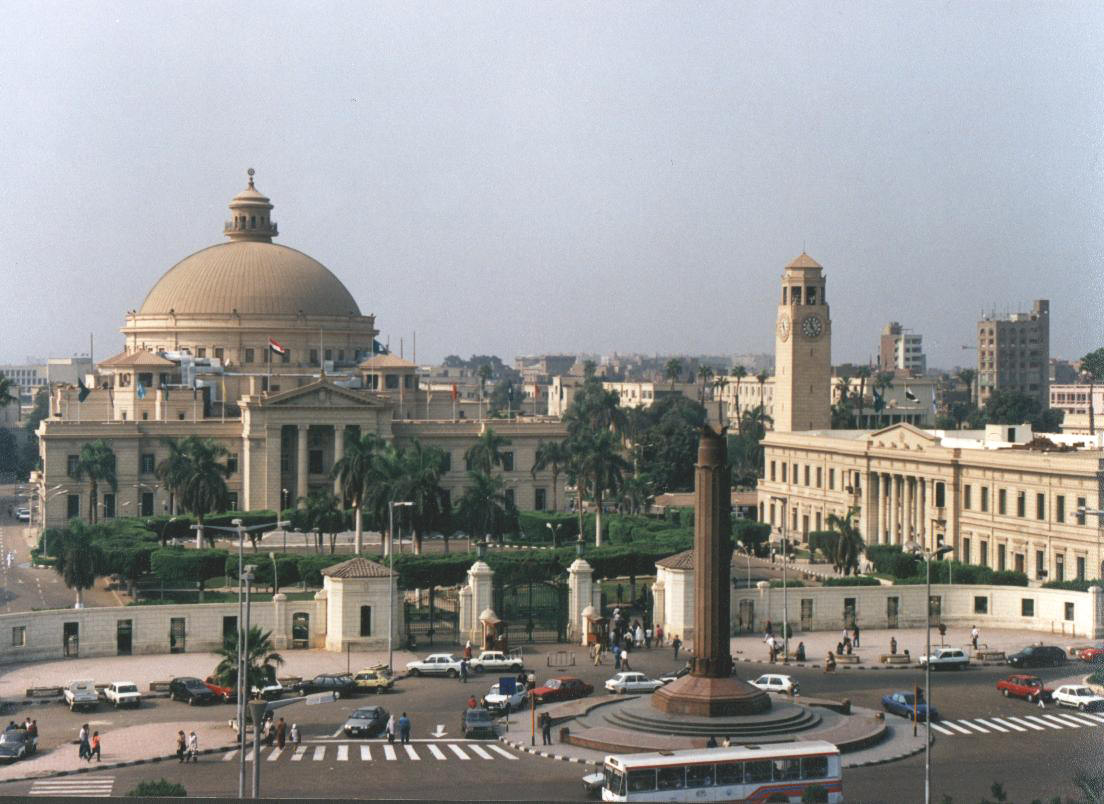The Cairo pilot was set up to link into the launch of the Management of African World Heritage Online Masters Course of the Cairo University and the Institute of African Research & Studies. This is a pilot in which the futures content is added to a pre-existing course in another domain. In this pilot the online component consisted of the pre-existing online Masters Course, which was blended with the face-to-face gatherings supported by LEALA. While this online activity runs for a whole academic year, the live activities took place over the course of two days with participants from the course organisation, students, the partner institution, and the national UNESCO commission of Egypt—all experts with a specific focus on world heritage, but with only limited knowledge of the relevance of futures literacy.
Cairo, Egypt
WFSF Fellow & Founding Member Emeritus Professor Samir Ghabbour (left) coordinated the Cairo LEALA Pilot. He worked with Cairo University and the Institute of African Research & Studies (IARS) to organize a one-day “Conference on the Future of African World Heritage” in November 2013 at the IARS Cairo University, Giza. It marked the launch of a new Masters Program on the Management of African World Heritage. This online Masters Program provides ample opportunity for capacity building in E-Learning on the African continent. Prominent speakers on African heritage argued that African (and Arab) World Heritage has recently been exposed to unprecedented factors of change and has suffered significant damage by deliberate destruction.
The conference, hosted by HE the President of Cairo University, focused on methods for preventing damage as well as conserving existing heritage. In December 2013 a follow-up workshop took place at the Egyptian National UNESCO Commission, under the auspices of HE the Deputy Prime Minister and Minister of Higher Education.
Benefits and major results obtained
Both the one-day conference at IARS on 28 November 2013, for non-initiated academics and students and the Workshop organized by the Egyptian National Commission for UNESCO on 21 December 2013 for World Heritage experts were successful. These events were attended by a total of no less than 70 participants. Most of the distinguished speakers brought in their texts and these have been bundled as full text in the IARS report on the events. This document is included in the LEALA pedagogical resources database. Some of the activities were video-recorded and will be made available on the LEALA video channel from August 2014.
 The activities culminated in a number of pertinent recommendations and in the elaboration of concrete steps for the activation and sponsoring of the new Master Degree at IARS. The recommendations highlight presently emerging threats that push the agenda for the future of African World Heritage towards immediate problem solving rather than long term visioning. Solutions for threats to African World Heritage are sought in two distinct areas: firstly, in real world environments and places and secondly in the minds of people, through education.
The activities culminated in a number of pertinent recommendations and in the elaboration of concrete steps for the activation and sponsoring of the new Master Degree at IARS. The recommendations highlight presently emerging threats that push the agenda for the future of African World Heritage towards immediate problem solving rather than long term visioning. Solutions for threats to African World Heritage are sought in two distinct areas: firstly, in real world environments and places and secondly in the minds of people, through education.
On the ground more protection is needed and more sites are to enjoy World Heritage status by inscription on the UNESCO World Heritage List. The second essential ingredient for improved African World Heritage protection is education with more attention for the future in education in general and in heritage education in particular. Professional heritage managers, caretakers and communities can benefit from heritage education with a futures outlook.
WFSF pilot coordinator Samir Ghabbour was present throughout the proceedings of the single day conference. His input provided a futures perspective to the overall motivation behind the event and guidance with long-term thinking concerning world heritage in Africa.
A significant benefit of the experience with this pilot is related to knowledge and capacity building for the blended learning strategies that LEALA proposes. Among our goals is to understand the different scales at which online education is organised effectively. While we are not directly involved in the development of the Online Masters course itself, the partnership with the IARS has brought to our attention some of the challenges of starting up full academic online courses. These include economic, administrative and organisational challenges that will have to be taken into account when the WFSF considers providing full online courses in future.
The organisation of a workshop day treating the future of African World Heritage with the Egyptian National Commission for UNESCO was a major benefit and accomplishment of this pilot. This workshop was not in the original planning but was an excellent opportunity taken up during the course of the project. The commission took up the logistical organisation of this day and the content and speakers and expert participants were sought out with the collaboration of the WFSF pilot coordinator.
Modifications
The pilot was run with half of the originally requested Participation Programme budget. The date proposed for the activity to connect into the celebrations of the 40th anniversary of the World Heritage Convention in 2012 could not be maintained as it was prior to the approval of the project for the UNESCO Participation Programme. The rescheduled activity could therefor not benefit from partnerships in the context of anniversary activities. The pilot was restructured considerably due to these broad budgetary and calendar constraints. Moreover, the launch of the actual online Masters Course this pilot was linked into was postponed so that the one-day conference became a stand-alone event. As this launch has been postponed and LEALA online tools were not yet available during the implementation of the pilot, there has not yet been online engagement of participants with the futures network or otherwise.
Originally a one-day set of educational activities (lectures by invited guests including WFSF members from the field of education) was proposed as part of a two-day conference. These activities were to focus exclusively on a futures introduction for the heritage specialists taking part in the event. Because such a full conference day could not be financed by LEALA the set-up was modified and the second day of the conference was dropped. The remaining conference day was focussed exclusively on the area of African world heritage. The title of the conference nevertheless still indicated the intention for an explicit futures orientation in African heritage work. Conservation and opening up heritage to the population are in themselves futures oriented activities, even if they are generally undertaken with little explicit reference to futures theories or methods. With LEALA we explicitly emphasised this futures dimension of the management of African world heritage.

